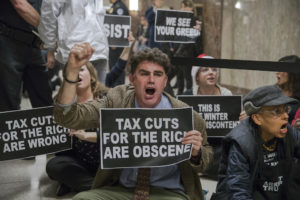Towards a Populist Climate Action
The climate crisis is a form of oppression by a wealthy few. Climate activists participate in a student-led climate change march in Los Angeles. Photo: Ringo H.W. Chiu / AP.
Climate activists participate in a student-led climate change march in Los Angeles. Photo: Ringo H.W. Chiu / AP.
In September 2022, an international group of climate scientists published a study showing that the world was close to, or in some cases had even surpassed, key tipping points in the climate crisis that would trigger irreversible changes in the world’s ecosystems. These include the collapse of the Greenland and West Antarctic Ice Sheets, tropical coral reef die-off, the abrupt thawing of Northern permafrost, the loss of Barents Sea ice, the melting of mountain glaciers, the dieback of the Amazon rainforest, and changes to the West African monsoon that will impact the Sahel region of Africa.
These points launch the world into the unknown and unknowable, as they engage feedback loops the consequences of which we cannot accurately predict. And yet those predictions concern the mass suffering and death of tens of millions, and maybe more. We are at a tipping point. And President Biden has yet to declare the climate emergency he publicly pondered in July 2022. He likely (and legitimately) fears a political backlash; populism is seen now as a barrier to climate reforms.
What’s wrong? Threats to our species as a whole, and to our survival, are amorphous things. They are too large, and too slow, for us—for the slowly evolving human brain—to see properly. But threats framed as originating from other persons, from the people around us are not. Our species is quite accustomed to dealing with such threats—this is the history of war. And in the case of things like pandemics, where amorphous threats like contagions were framed as threats by the government to deprive us of liberty, they have triggered terrifying populist responses.
The climate crisis certainly is a form of oppression, exacted upon a vast majority of middle and low-income folks by a wealthy few in a fossil fuel industry that knew and hid the facts of what it was doing, and the relatively few politicians and world leaders that authorized and enabled their acts. And while we are accustomed to scientists and those same politicians framing news regarding the crisis, or very young persons like Greta Thunberg with their angry but relatively muted responses centered on the rights of future generations, we can imagine other framings.
The world has faced unprecedented threats and the situations that followed them with unprecedented systems of justice.
What if the news that climate crisis-driven heat waves are killing people were not framed as a study or science at all, but the still true vision of a handful of wealthy elites and the few thousand political cronies that protect their profits by committing the indiscriminate killing of children, of grandmothers, and of pregnant women. Why not see it this way, in the terms our brains might react to? Why not frame it in terms of class, which triggers action on the right and left, often beyond the margins? Yes, climate change is an ethereal thing we cannot touch, like the bullets of Putin’s army, but that’s merely a choice of how we perceive it. Who pays the price of the crisis and who benefits from it, and the science that shows such a flow of responsibility, is a fact.
It could be that we do not frame it in this way because that framing does not present any particular solution, any better solution, than more amorphous frames. We still need to go to courts and other bodies to determine liability. We still need governments, and their processes to regulate emissions or build systems of sequestration. We still need massive regulatory networks to implement climate mitigation plans.
All of this is true, but it is also true that—like the trials at Nuremberg—the world has faced unprecedented threats and the situations that followed them with unprecedented systems of justice. Perhaps climate change is such an unprecedented threat, justifying solutions—like the demanding particularly culpable corporations follow the lead of companies like Patagonia—and begin to transform their structure accordingly to start to repair the damage they have caused.
That sort of demand, regardless of governments, would be particularly appropriate were the repairs treated as reparations and the beneficiaries future generations—the most likely class of persons to be harmed. Future generations could be best compensated through effective family planning incentives, entitlements, and reparations awarded to their parents through novel devices like private baby bonds that encourage sustainably sized families likely to maximize the resilience of their children. If we believe that government derives from the people, these solutions—ones that involve the creation of those people—precede and exceed the ability of governments, and the companies they protect, to refuse.
Moreover, how we frame the crisis can trigger the governmental processes described above by motivating officials to act, much the way the framing of the pandemic created massive political backlashes. There are many other examples of amorphous threats transformed into tangible ones. Certainly, the harms caused by the crisis, and the irreversible harms the tipping points promise, are cause for a populist backlash, if we just find a way to see it as the oppression of many by a few that it is.
Your support is crucial…With an uncertain future and a new administration casting doubt on press freedoms, the danger is clear: The truth is at risk.
Now is the time to give. Your tax-deductible support allows us to dig deeper, delivering fearless investigative reporting and analysis that exposes what’s really happening — without compromise.
Stand with our courageous journalists. Donate today to protect a free press, uphold democracy and unearth untold stories.






You need to be a supporter to comment.
There are currently no responses to this article.
Be the first to respond.